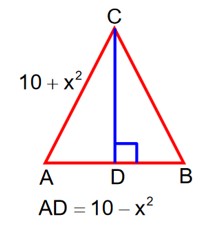Le tf(x) be a polynomial of degree 6 in x, in which the coefficient of x6 is unity and it has extrema at x = -1 and x = 1. If
then 5 f(2) is equal to……………….
Le tf(x) be a polynomial of degree 6 in x, in which the coefficient of x6 is unity and it has extrema at x = -1 and x = 1. If then 5 f(2) is equal to……………….
-
1 Answer
-
Let f(x) = x6 + ax5 + bx4 + ax3 + dx2 + ex + f
Non zero finite
So, d = e = f = 0
f(x) = x6 + ax5 + bx4 + cx3
Non zero finite
f’(x) =
f’(1) = 0
6 + 5a + 4b + 3 = 0
5a + 4b = - 9 .(i)
f’(-1) = 0
-6 + 5a – 4b + 3 = 0 .(ii)
Solving (i) and (ii)
a -3/5, b = -3/2
Similar Questions for you
y (x) = ∫? (2t² - 15t + 10)dt
dy/dx = 2x² - 15x + 10.
For tangent at (a, b), slope is m = dx/dy = 1 / (dy/dx) = 1 / (2a² - 15a + 10).
Given slope is -1/3.
2a² - 15a + 10 = -3
2a² - 15a + 13 = 0 (The provided solution has 2a²-15a+7=0, suggesting a different problem or a typo)
Following the image: 2a² - 15a + 7 = 0
(2a - 1) (a - 7) = 0
a = 1/2 or a = 7.
a = 1/2 Rejected as a > 1. So a = 7.
b = ∫? (2t² - 15t + 10)dt = [2t³/3 - 15t²/2 + 10t] from 0 to 7.
6b = [4t³ - 45t² + 60t] from 0 to 7 = 4 (7)³ - 45 (7)² + 60 (7) = 1372 - 2205 + 420 = -413.
|a + 6b| = |7 - 413| = |-406| = 406.
f' (c) = 1 + lnc = e/ (e-1)
lnc = e/ (e-1) - 1 = (e - (e-1)/ (e-1) = 1/ (e-1)
c = e^ (1/ (e-1)

Area
3x2 = 10
x = k
3k2 = 10
By truth table
So F1 (A, B, C) is not a tautology
Now again by truth table
So F2 (A, B) be a tautology.
From option let it be isosceles where AB = AC then
=
Now ar
then
So .
Hence be equilateral having each side of length
Taking an Exam? Selecting a College?
Get authentic answers from experts, students and alumni that you won't find anywhere else
Sign Up on ShikshaOn Shiksha, get access to
- 66k Colleges
- 1.2k Exams
- 681k Reviews
- 1800k Answers
